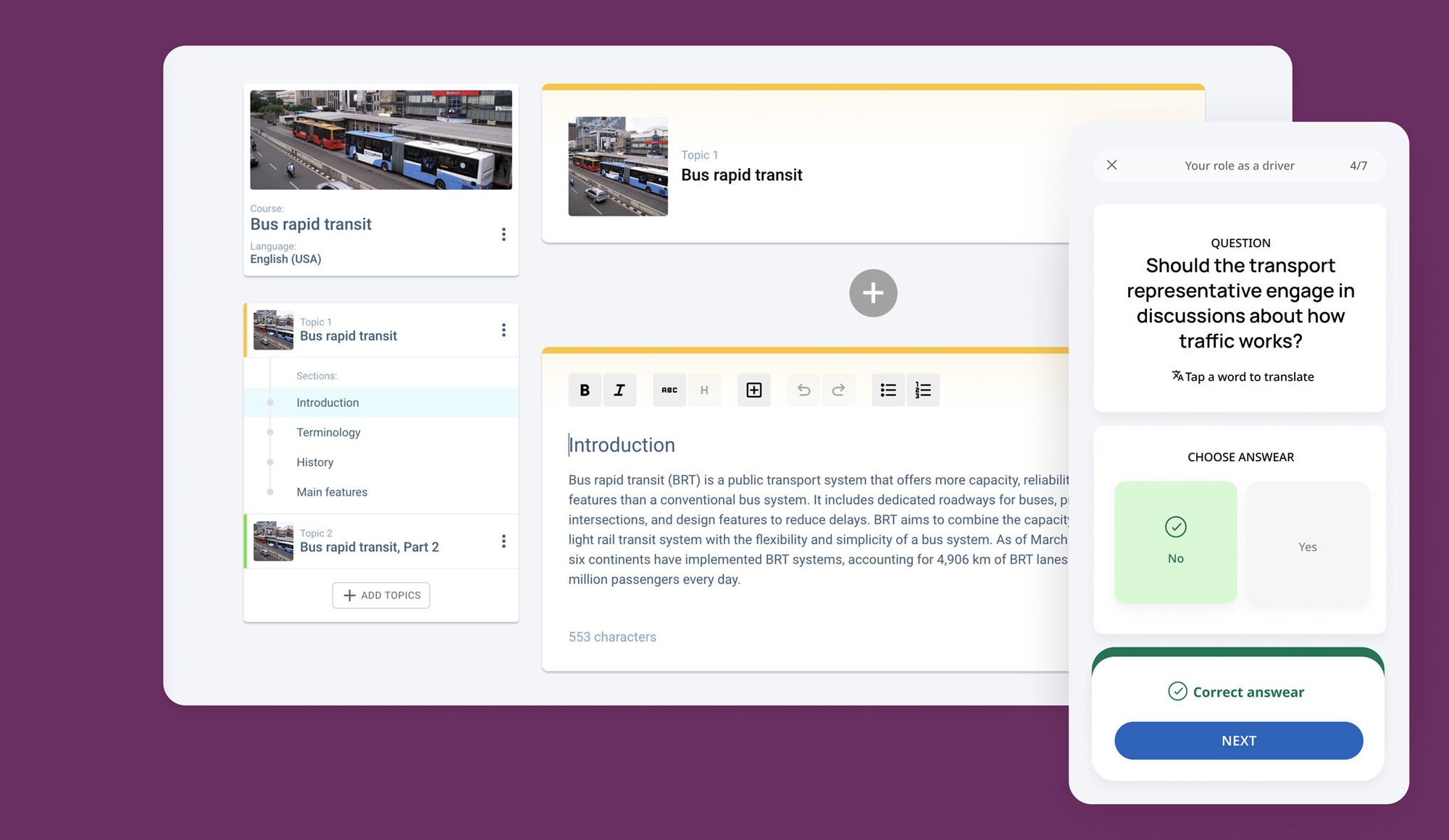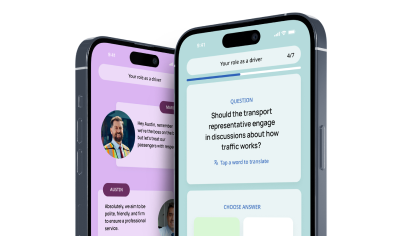While some individuals may naturally possess leadership abilities, even many experienced managers need proper training to develop the necessary skills. This article will explore the difference between a leader and a manager, the nuances of training a new manager in leadership, the importance of training new managers, the essential skills they need to acquire, and innovative ideas for designing a successful manager training program. Let's dive in!
Leaders and managers: what's the difference?
While "leader" and "manager" are often used interchangeably, they differ. A manager oversees day-to-day operations, ensuring tasks are completed and goals are met. On the other hand, a leader inspires and motivates their team, sets a clear vision, and guides them towards achieving that vision. It is essential for managers to possess both managerial and leadership knowledge to effectively lead their direct reports.
Managers are typically focused on maintaining efficiency and productivity within their teams. They are responsible for planning, organising, and coordinating resources to achieve specific objectives. Managers often have more formal authority within an organisation, with their primary goal being to ensure that tasks are completed on time and within budget.
Conversely, leaders are more concerned with creating a positive work culture and fostering innovation. They empower their team members, build strong relationships, and encourage personal and professional growth. A leader's influence extends beyond the day-to-day operations and aims to inspire individuals to reach their full potential individually and as a team.
The importance of training new managers
When new managers are promoted, they often need more skills to lead a team successfully. With proper training, they may delegate tasks, communicate effectively, and motivate their team members. Investing in a new manager training program ensures new managers can confidently take on their roles and drive their teams towards success.
Manager training goes beyond teaching basic leadership knowledge to effectively manage direct reports. It also involves providing insights into company culture, values, and goals, enabling new managers to align their team's efforts with the organisation's overall objectives. Furthermore, on-the-job training programmes can help new managers understand different management styles and approaches, allowing them to adapt their leadership techniques to suit various team dynamics and challenges.
Moreover, organisations demonstrate their commitment to employee development and growth by investing in management training for first-time managers. This not only boosts employee morale and engagement but also fosters a culture of continuous learning and improvement within the company. Ultimately, well-trained managers are better equipped to handle complex situations, make strategic decisions, and nurture a high-performing team that drives business success.
Essential skills for new managers
New managers must develop a range of skills to become successful leaders. These skills can be divided into two categories: key managerial skills and leadership soft skills.
Transitioning into a managerial role requires a blend of expertise in critical managerial skills and finesse in leadership soft skills. It is not merely about delegating tasks but also about inspiring and guiding a team towards shared goals.
1. Key managerial skills
Critical managerial skills include planning, organising, problem-solving, and decision-making. New managers must learn to prioritise tasks, allocate resources effectively, and make informed decisions aligning with the organisation's goals and objectives.
Effective planning involves setting clear objectives, outlining strategies, and creating actionable plans to achieve desired outcomes. Organising skills help structure tasks, roles, and responsibilities within the team to streamline workflow and boost productivity.
2. Leadership soft skills
Leadership soft skills are crucial for managers to build strong relationships with their team members. These skills include effective communication, emotional intelligence, active listening, empathy, and conflict resolution. Developing these skills enables managers to motivate and inspire their teams to achieve excellence.
Communication lies at the heart of leadership soft skills, encompassing the ability to convey ideas, provide constructive feedback, and foster open dialogue within the team. Emotional intelligence plays a vital role in understanding and managing one's own and others' emotions, promoting a positive work environment based on empathy and trust.
Common challenges new managers face
Transitioning into a managerial role can be challenging for individuals. New managers may face difficulties adjusting to their new responsibilities, building credibility, and earning the respect of their team members. Understanding and addressing these common challenges can help new managers thrive.
One key challenge that new managers often encounter is navigating office politics. As they move into a position of authority, they may find themselves caught in the middle of conflicts or power struggles within the team. Learning to diplomatically handle such situations while maintaining professionalism is crucial for new managers to establish themselves as influential leaders.
Another common hurdle for new managers is delegating responsibilities. Many individuals promoted to managerial positions struggle to let go of tasks they were previously responsible for, leading to micromanagement tendencies. New managers need to learn how to delegate effectively, empower their team members, and free up time to focus on strategic decision-making and leadership development.
Seven innovative training ideas for managers
Being an effective manager requires continuous learning and development. To help managers stay ahead in their roles, here are seven innovative training ideas that can enhance their skills and capabilities:
1. Interactive workshops
Organise engaging workshops where managers can actively participate in discussions, case studies, and interactive exercises. These workshops provide a platform for managers to learn from industry experts and share best practices. By encouraging active participation, managers can gain practical insights and apply them to their work situations.
2. Role-playing simulations
Simulate real-life scenarios for managers to practice their decision-making and problem-solving skills. Role-playing simulations allow managers to develop their skills in a controlled environment and receive constructive feedback. By experiencing different scenarios, managers can confidently enhance their ability to make effective decisions and handle challenging situations.
3. Mentorship programs
Pair new managers with experienced leaders who can provide guidance, support, and share their knowledge. Mentorship programs allow managers to learn from the experiences of senior leaders and gain valuable insights. Managers can receive personalised advice and develop their leadership capabilities through one-on-one interactions.
4. Gamified learning platforms
Utilise gamification techniques to make the learning process enjoyable and interactive. Incorporate quizzes, challenges, and rewards into training modules to enhance engagement and knowledge retention. By transforming training into a game-like experience, managers can stay motivated and actively participate in their development.
5. Virtual Reality (VR) training
Leverage VR technology to provide managers with immersive training experiences. VR simulations allow managers to practice skills in leadership in realistic scenarios, enhancing their decision-making abilities and confidence. By stepping into virtual environments, managers can gain practical experience and develop their skills as leader in a safe and controlled setting.
6. Peer learning circles
Facilitate peer learning groups where managers can share experiences, discuss challenges, and learn from each other. These circles foster collaboration and enable managers to expand their perspectives through diverse insights. By engaging in peer-to-peer learning, managers can gain different perspectives and learn from the experiences of their peers.
7. Blended learning programs
Create a comprehensive training program that combines various learning methods, such as in-person workshops, online courses, and self-study materials. Blended learning provides flexibility and accommodates different learning preferences. By offering a mix of learning opportunities, managers can choose the best methods for them and tailor their development journey accordingly.
20 simple tips for manager-to-leader training
- Clearly define learning objectives and desired outcomes for the training program.
- Tailor the training program to align with the company culture and values.
- Incorporate real-life examples and case studies to make the training relatable.
- Provide frequent opportunities for managers to practice their newly acquired skills.
- Offer ongoing support and coaching to reinforce learning and encourage growth.
- Encourage managers to seek feedback from their team members and peers.
- Foster a workplace culture of continuous learning within the organisation.
- Stay up-to-date with the latest leadership theories and best practices.
- Include activities that promote self-reflection and self-awareness.
- Celebrate successes and recognise managers' progress throughout the training program.
- Encourage managers to set personal development goals and track their progress.
- Offer resources for further reading and self-study.
- Provide access to leadership development workshops and conferences to identify skill gaps.
- Foster cross-department collaboration to develop a broader perspective.
- Create opportunities for managers to network with other leaders in the industry.
- Empower managers to make decisions and take ownership of their roles.
- Foster an inclusive and diverse environment that values different perspectives.
- Encourage managers to seek feedback from their team members and peers.
- Develop customised training modules for specific leadership roles within the organisation.
- Regularly evaluate the effectiveness of the training program and make necessary adjustments based on feedback.
By incorporating these considerations into the training program, organisations can create a comprehensive and practical leadership development journey for their managers. Building strong leaders is not a one-time event but an ongoing commitment to growth and development.
Leadership is about inspiring people
Training managers to become leaders is vital for the success of any organisation. Organisations can cultivate a strong leadership culture that drives growth and success by understanding the difference between a leader and a manager, recognising the importance of training new managers, and providing them with the necessary skills. Implementing innovative training ideas and following simple tips can help organisations design and deliver effective manager training courses. Remember, leadership is not only about management skills but about inspiring and empowering others to achieve their full potential.
Transform your managers into inspiring leaders with Lingio
Ready to elevate your management team to new heights of leadership? At Lingio, we understand the power of engaging, AI-driven learning experiences. Our innovative approach combines the fun of gamification with the personalised touch of coaching, ensuring your managers acquire skills for leadership and embody them. Discover how Lingio can make a transformative impact on your team's development. Book a demo today and witness the evolution of learning with Lingio's AI Course Creator.
FAQs
1. Why is it important to train managers to be leaders?
Training managers to be leaders is essential as it equips them with the skills to inspire, motivate, and guide their teams towards success. Influential leaders positively impact employee satisfaction, engagement, and overall performance.
2. What are some essential leadership skills for new managers?
Essential leadership skills for new managers include effective communication, emotional intelligence, active listening, empathy, conflict resolution, and the ability to motivate and inspire others.
3. How can organisations design an effective manager training program?
Organisations can design an effective manager training course by incorporating various components such as interactive workshops, role-playing simulations, mentorship programs, gamified learning platforms, virtual reality training, peer learning circles, and blended learning programs. Customising the training program to align with the organisations goals and values is essential.
4. How can managers continue their leadership development beyond the training program?
Managers can continue their leadership development beyond the training program by seeking ongoing support and coaching, setting personal development goals, seeking feedback from their team members and peers, and staying up-to-date with the latest leadership theories and best practices.
5. How can organisations evaluate the effectiveness of their manager training programs?
Organisations can evaluate the effectiveness of their manager training programs by collecting participant feedback, assessing the impact on their performance and the overall success of their teams, and regularly reviewing and updating the training program based on the feedback received.
Training managers to be influential leaders is not just about imparting knowledge and skills but also about nurturing their personal growth and development. It creates an environment where managers can thrive and become their best version. This can be achieved through ongoing support and coaching, which allows managers to reflect on their experiences, learn from their mistakes, and continuously improve their leadership abilities.


Table of contents
Intro
Leader and manager: what is the difference?
The importance of training new managers
Essential skills for new managers
Common challenges new managers face
Seven innovative training ideas for managers
20 simple tips for building your training for managers to become leaders
Leadership is about inspiring people.
Transform your managers into inspiring leaders with Lingio
FAQs

